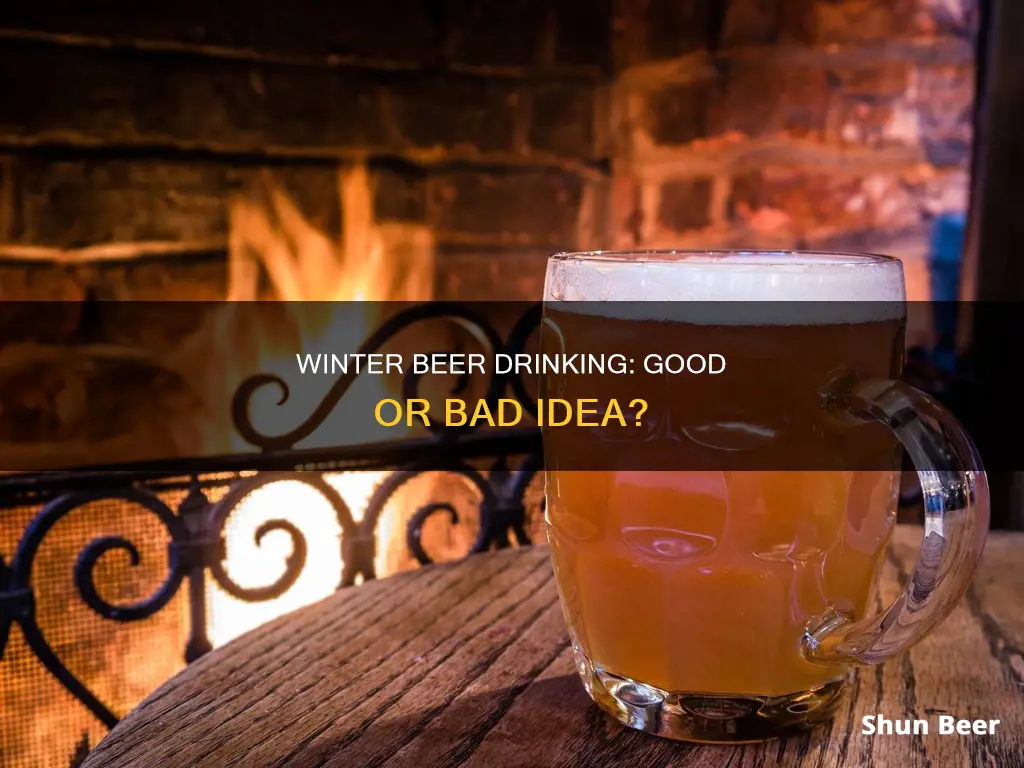
Beer is a popular drink for many, but is it the right choice during the winter months? While some may argue that beer is a summer drink, it has become a year-round beverage for many, especially the younger generation. However, drinking beer in cold weather comes with certain risks that should be considered. Alcohol can give a false sense of warmth, impacting our ability to gauge our body temperature, and leading to a higher risk of hypothermia. This effect is due to the dilation of blood vessels when consuming alcohol, which pulls heat away from the body's core, vital organs, and brain. Additionally, alcohol dehydrates the body, further increasing the risk of hypothermia. So, should we skip the beer this winter? The key lies in moderation. While heavy drinking can significantly lower body temperature, moderate consumption may only result in minor symptoms like warmth and flushing, without a substantial impact on core temperature.
What You'll Learn

Beer preference changes with the season
In winter, people tend to opt for darker, richer, and more flavoursome beers. These beers pair well with heartier dishes like kebabs, momos, and tikkas, providing a satisfying drinking and dining experience during the colder season.
While beer can be enjoyed in winter, it's important to be mindful of the potential health risks associated with drinking in cold weather. Alcohol can give a false sense of warmth, as it causes blood vessels to dilate, sending more blood to the skin and creating a sensation of warmth. However, this process pulls heat away from the body's core, leading to a drop in body temperature. This effect can increase the risk of hypothermia, especially if spending extended periods outdoors in cold environments.
To drink beer safely in winter, it's recommended to follow certain precautions. Wearing multiple layers of clothing, including warm layers, can help insulate the body and prevent heat loss. It's also important to eat high-energy or fatty foods and drink warm beverages when possible to maintain energy levels and body heat. Additionally, staying mindful of alcohol consumption and alternating with non-alcoholic drinks can help mitigate the risks associated with drinking in cold weather.
In summary, while beer preference may shift towards darker and richer varieties during the winter season, it's crucial to prioritise safety and be mindful of the potential health risks associated with drinking in cold environments. Enjoy your beer responsibly and in moderation during the winter months!
Beer in a Bag: Drinking Laws in Washington State
You may want to see also

Alcohol and freezing temperatures
Beer, for example, will freeze at a warmer temperature than vodka because beer has a lower alcohol content. The freezing point of beer is somewhere between the freezing points of water and ethanol alcohol, depending on its alcohol content. The same is true for wine, which also has a lower alcohol content and will freeze more easily than hard liquor. However, it is worth noting that even 80-proof liquor can freeze in extremely cold temperatures, such as those found in a chest freezer.
When it comes to drinking alcohol in freezing temperatures, there are some safety considerations to keep in mind. Alcohol consumption can give us a false sense of warmth because it causes our blood vessels to dilate, making our skin feel warm. This can be dangerous if we spend too much time outside in cold weather, as it increases the risk of hypothermia. To stay safe while drinking in cold weather, it is recommended to wear multiple layers of clothing, eat high-energy foods, and opt for warm drinks when possible. It is also important to be mindful of your limits and stick to them, as well as to avoid mixing alcohol with other substances.
In terms of drinking beer specifically in winter, it is a matter of personal preference. Beer is often associated with summer, but consumption patterns have changed, and it is now common to see people drinking beer in substantial quantities even in the winter months. When pairing beer with food in winter, it is recommended to opt for darker, richer, and more flavoursome beers to complement piping hot kebabs, momos, and tikkas.
Beer Drinking: Why Do People Enjoy This Beverage?
You may want to see also

Food pairings with beer in winter
Beer is a versatile drink that can be enjoyed all year round, and in winter, darker, heavier beers are a popular choice. The rich qualities and warming aromas of these beers are especially appealing when the temperatures drop.
Spicy Foods and Hoppy Beers
Hoppy beers can make foods seem spicier, so if you're looking for a kick, pair a hoppy beer with spicy dishes. Wheat beers, for example, go well with spicy foods and can also be paired with fruity desserts.
Rich, Heavy Meals and Darker Beers
Darker beers typically pair well with rich, heavy meals. The roasted flavours of brown ales or darker ales complement grilled foods with similar roasted or smoked flavours. The chocolate and coffee notes of stouts also go well with grilled dishes, such as kebabs, tikkas, and barbecued meats.
Salty and Sweet Combinations
Sweet and salty combinations can also work well in winter. A sweet stout, for instance, can be paired with a salty oyster dish.
Lighter Dishes and Dark Ales
Dark ales, which are typically not very bitter, can also be served with lighter protein dishes like sushi or teriyaki salmon.
Desserts and Stouts
Stouts, with their chocolatey flavour and relatively low alcohol content, are a perfect pairing for many kinds of desserts. Try a stout with brownies, truffles, cheesecake, or cookies.
Hearty Stews and Soups
The comforting flavours of dark ales, with notes of molasses, brown sugar, and nutmeg, pair well with hearty stews and soups.
Bottoms Up Beer: How Does This Novelty Work?
You may want to see also

Alcohol dehydrates you
Alcohol is a diuretic, which means it promotes urine production. This is why drinking alcohol can cause dehydration.
When you drink 200 millilitres of beer, you would expect to pass 200 millilitres of urine. However, you will actually pass around 320 millilitres of urine. So, for every shot of alcohol, you will urinate an extra 120 millilitres on top of your normal urine output.
Alcohol interferes with the mechanism that regulates water levels in the body. The pituitary gland in the brain produces the antidiuretic hormone vasopressin, which controls how much water the kidneys reabsorb and retain. Alcohol reduces the amount of vasopressin produced, so the body retains less water and produces more urine.
Drinking alcohol on an empty stomach can also contribute to dehydration. Without food in the stomach, alcohol goes straight into the bloodstream instead of being absorbed more slowly through the stomach and small intestine. Large quantities of alcohol can also suppress appetite, making a person less likely to eat while drinking, which can speed up alcohol absorption and dehydration.
The risk of dehydration is greater for older adults and people with chronic conditions. To prevent dehydration, it is recommended that people drink alcohol in moderation, slowly, and with water or other hydrating beverages.
Beer vs Liquor: Which Drink is More Harmful?
You may want to see also

Alcohol and cold weather safety tips
While a beer or a whiskey might seem like the perfect drink to warm you up during winter, drinking alcohol in cold weather can be dangerous. Alcohol can give you a false sense of warmth, putting you at greater risk of cold exposure and other health issues. Here are some safety tips to keep in mind when drinking in cold weather:
Understand the Risks
Alcohol is a vasodilator, which means it causes your blood vessels to expand or dilate, sending more blood to your skin. This can create a sensation of warmth and flushing, but it also pulls heat away from your body's core, including your vital organs and brain. As a result, your body temperature drops, and you are at an increased risk of hypothermia. Alcohol also dehydrates you, which can further contribute to hypothermia and make it harder for your body to regulate its temperature.
Dress Appropriately
If you are going to be drinking in cold weather, make sure to wear warm clothing and dress in layers. This will help insulate your body heat and protect you from the cold. Cover areas that are most susceptible to frostbite, such as your hands, feet, and ears.
Eat the Right Foods
Eat fatty or high-carb foods before drinking, as they can help slow the absorption of alcohol and provide your body with energy. Avoid eating icy or cold foods, as they can further lower your body temperature.
Drink in Moderation
Drinking in moderation is always important, but it is especially crucial in cold weather. Excessive drinking can significantly lower your body temperature and impair your judgment, making you more likely to make risky decisions, such as shedding layers or walking long distances in the cold.
Stay Sober
If possible, have a sober friend with you to ensure that you make responsible decisions. They can help you stick to your limits and look out for any signs of alcohol poisoning or hypothermia.
Know the Signs of Alcohol Poisoning and Hypothermia
Be aware of the signs of alcohol poisoning and hypothermia, and don't hesitate to call for help if you or someone around you is displaying any of these symptoms. Signs of alcohol poisoning include passing out, slow or no breathing, vomiting while passed out, involuntary defecation or urination, pale or bluish skin, and gurgling or heavy breathing. Signs of hypothermia include shivering, slurred speech, confusion, and drowsiness.
Understanding Beer Pumps: The Inner Workings Explained
You may want to see also
Frequently asked questions
Drinking beer in winter is not harmful if done in moderation. However, excessive drinking can be dangerous as it gives a false sense of warmth, making you more susceptible to the cold and illnesses.
Alcohol is a vasodilator, causing the blood vessels to expand and bringing more blood to your skin. This makes you feel warm and look flushed, but it also pulls heat away from your body's core, reducing your body temperature.
Drinking beer in winter can increase the risk of hypothermia, as it affects your ability to gauge your body temperature. It can also lead to dehydration, making it harder for your body to regulate its temperature.
Beer can be a enjoyable part of a winter party or gathering. It can also be paired with various winter foods, such as kebabs, momos, and tikkas.
If you choose to drink beer in winter, it is important to drink in moderation and be aware of the risks. Eat fatty or high-carb foods before drinking, alternate alcoholic and non-alcoholic drinks, and wear warm clothing in layers.







